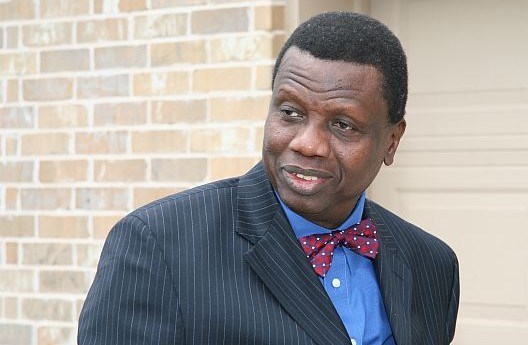
As the mixed reactions continue trailing the security challenges in the country and the recent prayer walk against the insecurity by the General Overseer of Redeemed Christian Church of God, Pastor Enoch Adejare Adeboye, our analysis has shown that Nigerian newspapers are portraying the walk as a protest.
On Sunday, Pastor Adeboye said “After the service, we are all going for a prayer walk. We will march according to our age. There are some who would march round the church because of their age and there are some who would march with me to Atan Cemetery and back.”
Exhibit 1: Nigerian Newspapers’ Framing of the Event
Register for Tekedia Mini-MBA edition 19 (Feb 9 – May 2, 2026): big discounts for early bird.
Tekedia AI in Business Masterclass opens registrations.
Join Tekedia Capital Syndicate and co-invest in great global startups.
Register for Tekedia AI Lab: From Technical Design to Deployment (next edition begins Jan 24 2026).
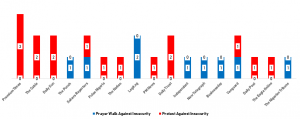
With the use of “Protest” mostly by the journalists and editors in their reportage of the event, they have succeeded in increasing Nigerians’ interest about protest than about prayer walk, the real phrase used by the prominent Pastor, between February 2 and February 3, 2020. Our analysis reveals that the newspapers have also intermittently used “prayer walk” and “Protest” to frame reactions that trailed the event from February 2 to February 3, 2020.
Out of 25 news stories we select and analysed, 16 reports established the event as a protest against the insecurity, while 9 reports wanted the public to see it as prayer walk against the challenge that has been ravaging the country since 2009, when the insurgency became part of the security problems facing the country.
Exhibit 2: Number of News Report by Framing Category
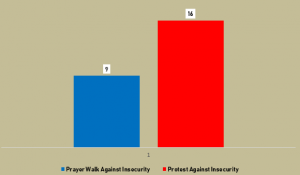
In our efforts of clarifying issues from experts’ views, we sought the view of Kamorudeen Salaudeen, a lecturer and head of Mass Communication Department at the Fountain University Osogbo in Osun State. As a specialist in communication and media studies, he links the newspapers’ approach thus far to lack of professionalism and commercialisation of every news by the media entrepreneurs. Excerpts:
In the last few years, it has appeared that Nigeria is facing a lot of challenges in its political and economic life. One factor that has significantly contributed to the discourse on the challenges is information or misinformation. As an expert in communication and media studies, how would you describe this?
Let me start with a cliché but useful statement: information is the lifeblood of the society. To strengthen this further, communication is sociologically defined as the mechanism through which human relations exist. This lays credence to the significance of information and communication for human beings as gregarious creatures. Again, we take decisions based on the quality of information we have and the quality of our interpretation thereof. We can then imagine cases of misinformation, disinformation, information overload and information underload. Many of the times, politicians deliberately use information dishonesty to sway people or get their buy-in for election of policy agenda. Seating political powers also economise with the truth many a time for self-aggrandisement. This has seriously affected our national progress in the reverse order.
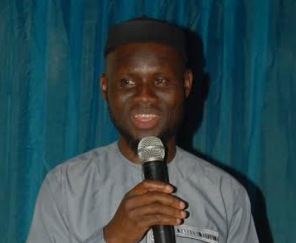
Journalists and media establishments have been found culpable in most cases for the misinformation, which has been linked to hate speech and fake news. What is stance on this?
Seriously, this is a global phenomenon resulting from deregulation, privatisation and commercialisation of media and news items. This also led to commoditisation of news, which is supposed to be neutral, balance and fair. The scramble for listenership, readership and viewership as the case may be among our media genres has caused unprofessional treatment of news items. Media outfits have been found compromising ethics and professionalism in the process of attracting advert driven traffics to their media. Besides, the rush to be the first to break the news necessarily precludes thorough jobs being done on a story before reeling it out. Social media and the internet, as free as it is has also encouraged the proliferation of quacks in this noble profession. With online media genres, everybody is now a journalist and sometimes the unsuspecting public may not unfortunately be able to distinguish truth from false. The media is an oracle. You remember the “War of the World” in the 1920s.
The widely open door into the industry facilitated by the www gives room for massive entry of quacks when haven’t learnt the ropes of the job in the industry. Many of them masquerade themselves behind the professional concept of citizen journalism or i-journalism. But the problem man ranges from poor use of language to unprofessional writing structures. For instance, when RCCG had a walk and a medium reported it as a protest. Journalism training, especially in schools where language is a component of the training will equip you with appropriate choice of diction. The same way a walk in not a protest, protest is also different from revolution. In actual sense, where you plan a protest but announce a revolution, you’ve presented yourself for the charge of serious treasonable felony offence. It’s our collective responsibility to ensure responsible journalism. Communication schools, practitioners, media houses and regulatory bodies, we all have roles to play.
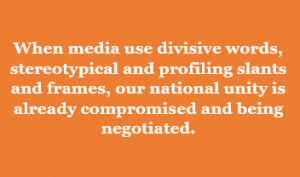
Headline writing is the first signpost that attracts people to the stories. How would you describe the patterns and styles of writing it within the Nigerian social and political challenges?
Headline is a signal to the message of the story. Some scream while others blow horn. Many are just normal. The most important thing is the professional handling. Hence, headline crafting is a vocation of craft. It’s even a sort of “chieftaincy” role. That’s why the greenhorns aren’t give such a sensitive role even when they have the byline. Headline is very powerful; research has indicated that five times readers of a story must have read the headline. Essentially, majority will read a headline without reading the story. For instance, there is a difference between “WHO says Nigeria is 2019-nCov free” and “WHO says Nigeria is 2019-nCov free?” Headlines are that technically serious. They may inform as well as mislead or misinform.
What are the implications of being unprofessional in this regard on national unity?
Tellingly, the implication damaging and destructive. An unprofessional journalist is more dangerous than a quack surgeon. While a quack surgeon would only commit murder, the unprofessional journalist would have committed genocide. Engaging a quack journalist is like leaving a child with a life riffle of timed explosive within the homestead.
This is why many positive events in the country don’t get reported it at best get improperly reported while negative events take banner and screaming headlines in a prime page of the newspaper on a daily basis. So, we then report our affairs as if we are a bunch of satanic nation. The media is a double-edged sword. When media use divisive words, stereotypical and profiling slants and frames, our national unity is already compromised and being negotiated.



